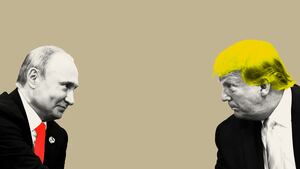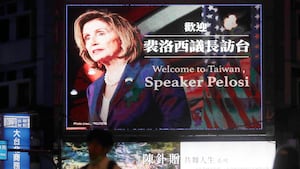If the United States Air Force employed one properly trained birthday clown, we could handle this Chinese balloon “crisis” in a manner suited to the negligible threat being posed. A couple of quick moves and the balloon would be in the shape of a puppy, and we could all turn our attention back to the serious business of the world’s most important bilateral relationship.
Instead, U.S. Secretary of State Antony Blinken has postponed his trip to China amidst needless hysteria, in an act of pure domestic political theater. The Biden administration’s actions are more a defense against the hyper China hawks in the GOP than they are against any threat the Chinese might pose—particularly with the 18th century technology they have supposedly unleashed against us—intentionally or otherwise.
Because let's be clear, freaking out over what is the Pentagon characterizes as a surveillance balloon is, in the context of the daily reality of the how the U.S., China and most major nations conduct their spying pretty darn dumb. Not to mention, hypocritical.
The U.S. keeps as a state secret the amounts of money it spends each year on high tech espionage and surveillance. But we do know that we spend tens of billions a year on space-based surveillance. According to estimates, about one-fifth of all satellites have military purposes, and the U.S. launches several a year.
Estimates suggest that we have over 150 military satellites, about a third of which belong to the National Reconnaissance Office (NRO). There are probably three times that many satellites with some U.S. government role associated with them. And every other country plays that game. As reported by the German DW news organization, as of a couple years ago, China had 63 military satellites and Russia had 71.
And that’s to say nothing of the other forms of spying and surveillance undertaken by all nations all the time. For example, the 16 U.S. spy agencies employ well over 100,000 people. Our published budgets show spending of almost $90 billion a year on intelligence.
Sure, China has long been known to spy on the U.S. But the forms of spying which have been most advantageous for the Chinese have certainly not been the result of stray balloons carried to America by wind currents they could not control. (And frankly, if there is one form of Chinese intelligence we really should be worried about, it’s their vast spending on developing artificial intelligence capabilities—investments which may double to $27 billion in the next three years.)
So, let’s take a deep breath.
The balloon poses a negligible threat, if any. It is certainly not news that the Chinese are spying on us. And we are definitely in no position to condemn them for spying. The balloon does not represent an escalation or any sort of material (or even trivial) change in our relationship with China. It certainly does not warrant postponing an important high-level dialogue between our two countries.
Indeed, the balloonatic reaction we’re seeing suggests more high-level dialogue is needed because there are forces at play in the U.S. that are committed to pushing us into a new Cold War with China—or worse.
The launch of the House Select Committee on Strategic Competition Between the United States and the Chinese Communist Party, chaired by Republican Rep. Mike Gallagher of Wisconsin, has been conceived with the implicit purpose of hardening our rivalry with China into a dangerous enmity. It also creates a permanent platform from which to assail the administration for being too “soft” on China.
Hence, predictably, you have Republicans condemning President Joe Biden for “allowing a CCP military balloon to fly freely over Montana” and for “not securing our airspace.” House Speaker Kevin McCarthy tweeted that “China’s brazen disregard for U.S. sovereignty is a destabilizing action that must be addressed.”
Of course, as noted above, the action is hardly significant in any real terms and definitely not destabilizing—except to the degree that it produces over-the-top Republican responses, and then reactions from the administration, such as postponing Secretary Blinken’s trip.
China, by the way, quickly sought to defuse the tension associated with the incident, with its foreign ministry expressing regret, blaming the course of the balloon on the winds aloft, and saying the balloon was conducting climate research.
Whether that is a sign of guilt or simply a recognition that this is a headache they did not need, remains to be seen. However, it does suggest that the Chinese government did not intend at this moment to ratchet up tensions between the two countries. (That will wait until whenever Speaker McCarthy heads off to Taiwan, as he has promised to do.)
With some luck, cooler heads will prevail and this balloon will simply drift off into memory. That said, the entire incident has produced one important piece of intelligence not just for China but for the U.S.
The world’s most important international relationship is on a hair-trigger right now. There are forces actively seeking to make it worse. This is a moment that will demand both sides exercise caution, try to avoid unnecessary provocations, and rather than reducing or delaying opportunities for exchange, spend more time in high-level communications to enhance understanding and to find mechanisms for reducing tension.
The alternative is far too dangerous to contemplate. It was perhaps best described in the hopefully-not-too prophetic 1983 hit by the German new wave band Nena, “99 Luftballons” in which a number of stray balloons crossing a border in a world on edge cause a nuclear conflagration.








